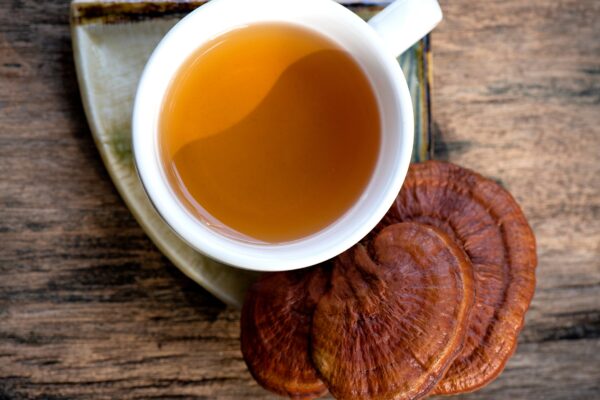Blog
Reishi, Ganoderma Lucidum, and Lingzhi Tea
Reishi (Ganoderma lucidum) mushrooms have become the mushroom of choice for those looking to improve their health, boasting polysaccharides, ergosterol and other compounds with antitumor activity as well as immunopotentiating, hypocholesterolemic, and detoxifying benefits.
Clinical research indicates that G. lucidum supplements may prevent and treat cardiometabolic diseases by decreasing major cardiovascular risk factors. Unfortunately, there have also been reports of adverse reactions due to this herb.
Health Benefits
Traditional Chinese medicine uses Reishi mushroom (Ganoderma lucidum; Lingzhi) and green tea together for general health promotion and longevity, and as treatments for specific illnesses. Recent scientific research shows that this combination enhances immune system functioning while simultaneously possessing antitumor, antiinflammatory, antioxidant and antidiabetic properties – an effect which could potentially benefit all sorts of other conditions as well.
Reishi mushroom contains many essential nutrients, including vitamins B6, riboflavin, niacin, calcium potassium and zinc. Additionally, Reishi is rich in enzymes such as superoxide dismutase and lysozyme as well as its own steroid known as Ganodosterone which has antihepatotoxic and immunostimulatory properties as well as rich protein sources, phenolic compounds and polysaccharides.
Study results revealed that freeze-dried G. lucidum had significantly greater antioxidant activity than heat-dried varieties, with water-soluble glycoproteins, lucidenic acid, and 12-acetyl ganoderic acid F all being major contributors to its potency. Its activity was comparable with medicinal mushrooms such as G. sichuanense and G. lentiforme and may be caused by polysaccharides like beta glucans present.
Reishi can help to lower cholesterol and blood pressure. It is an effective treatment for hyperlipidemia, diabetes and heart disease; plus an ideal herbal remedy to reduce stress levels and boost immune functions. Reishi supplements are available over-the-counter as tablets, capsules, extracts or powders.
Lingzhi tea is a favorite beverage in Korea. Made of mushroom extract, this drink can serve as an herbal remedy to treat high blood pressure or other ailments. Brewing can take place either with hot or cold water and sweetness can come from honey, sugar or artificial sweeteners; Lingzhi also acts as a good energy booster!
Ganoderma lucidum is a multiporous macrofungus that thrives on deciduous tree stumps such as oak, elm, acacia, maple, magnolia and willow trees. Cultivation for medicinal use has spread around the world; for instance in the US northeast it grows on trunks of old elm trees while China uses them on Chinese fir bark and agricultural byproducts such as paddy husk and straw [1,2]. Cultivation without pesticide or herbicide use [1,2].
Anti-tumor
Ganoderma lucidum (Lingzhi tea) is an extremely beneficial medicinal mushroom with strong anti-tumor properties. Its polysaccharides and triterpenoids can strengthen immune systems while protecting from cancer; additionally, its lectins and bioactive peptides possess immunomodulatory effects. Lingzhi tea contains various nutrients and is an excellent source of vitamins C and E as well as beta carotene. Furthermore, its Germanium content boasts antitumor and hepatoprotective benefits while being blended from tea leaves with Ganoderma extract for maximum absorption. Available both as capsules and liquid, its ingredients have been carefully chosen to ensure their highest possible quality. Used extensively in traditional Chinese medicine for centuries, ginseng has proven not only anti-tumor properties, but can also reduce anxiety levels and promote longevity.
Ganoderma is a multicellular fungus found worldwide and found on deciduous tree stumps such as oak, maple, elm, willow and magnolia trees. It can be found across Asia, Europe, North and South America as well as Africa; with long kidney-shaped caps with dark red to brown hues resembling Boletus species but featuring its own distinct spores and smell.
Studies conducted both in vitro and preclinically have revealed G. lucidum to possess antitumor properties such as cytotoxicity, cytostaticity, antimetastaticity and immunomodulating activity. Limited clinical trials have also confirmed its ability to enhance immunity in cancer patients and limit tumor growth.
Mushrooms contain many beneficial compounds, including polysaccharides, polysaccharid ergosterol and coumarin. Organic acids and water-soluble proteins also contain beneficial components as do organic acids, water-soluble proteins, fatty acids and alkaloids found within mushrooms. Studies have revealed cytoprotective and antioxidant effects of mushroom consumption while it’s rich in b-carotene and linoleic acid as well as neuroprotective enkephalins found in them.
Ganoderma lucidum mushrooms have long been noted for their aphrodisiac and longevity-enhancing effects, and modern research has validated ancient claims regarding them. Additionally, these mushrooms have demonstrated antidiabetic and hypoglycemic activities related to inhibiting a-glucosidase activity while simultaneously increasing insulin sensitivity – two activities traditionally reserved for pharmacology only.
Anti-inflammatory
Ganoderma lucidum, commonly used in Asian cultures for centuries, has many health benefits that may help strengthen immunity, reduce inflammation and enhance heart health. Studies have also identified anti-tumor and anti-fibrotic properties. Recently, researchers identified several compounds which may provide new therapeutic targets for G. lucidum.
Ganoderma is a macrofungus found on deciduous tree stumps, including oak, sycamore, maple, elm, willow, sweetgum magnolia and acacia [1,2]. Carlo Vittadini first described Ganoderma in 1831 and it now comprises over 250 species worldwide, of which six have medicinal benefits: G. lucidum (Lingzhi tea), G. applanatum G. sinense G tsugae G capense [3,4].
G. lucidum contains bioactive polysaccharides such as b-1-6-D-glucans, a-1-6-D-mannans and glycoproteins that have been shown to induce anti-inflammatory cytokines while simultaneously suppressing pro-inflammatory ones such as tumor necrosis factor-alpha and interleukin-1 beta production.
Polysaccharides have been demonstrated to improve insulin sensitivity and decrease blood sugar levels in diabetic animals. Furthermore, polysaccharides were shown to bolster immune responses and increase survival in animal models of leukemia and hepatitis B virus apoptosis.
Studies have demonstrated that Reishi extracts can successfully combat both cancer cell proliferation and malignant tumor growth, likely through its immunomodulatory effects and ability to inhibit oncogene expression, promote differentiation of tumor cells into normal cells, reduce oxidative stress levels and prevent cell aging which play key roles in chronic diseases development.
Reishi contains antioxidants essential to human health, as well as enzymes like superoxide dismutase and lysozyme, vitamins C and E as well as beta carotene – not to mention it’s natural hepatoprotective properties! Due to this rich nutrition profile reishi makes an ideal addition to any healthy diet; however it should never replace professional medical advice or care.
Antioxidant
Ganoderma lucidum, commonly used in traditional Chinese medicine for its immune-enhancing properties, contains various enzymes including superoxide dismutase and lysozyme, along with protein. Furthermore, this edible mushroom boasts high amounts of germanium which possesses antitumor and antiviral properties as well as being an abundant source of vitamins C, E and b-carotene – in fact research has proven lingzhi tea ganoderma is an extremely potent antioxidant capable of both increasing immunity while protecting cells against damage while simultaneously increasing immunity against damage caused by cell damage while simultaneously increasing immunity against cell damage; additionally its biological activities including immunomodulation and antitumor activity cellular antitumor activity are all well documented by research studies.
Ganoderma lucidum fungus has long been believed to aid metabolic processes in humans, as well as serve as an effective natural antidiabetic agent. Research on animals with diabetes revealed an increase in insulin sensitivity and reduced blood sugar levels from using Ganoderma lucidum; additionally it was proven beneficial in improving cardiovascular health and protecting against stress-related disorders while strengthening immunity systems and providing relief from sleep problems.
Fungi have antioxidant effects thanks to polysaccharides and triterpenes found in their tissues, in particular C30 pentacyclic triterpenes such as Lucidenic acid, Ganoderic acid D, Ganoderic acid F and 12-acetyl Ganoderic acid F. G. lucidum effectively reduced neointimal thickening in a carotid-artery-ligation mouse model by inhibiting oxidation of LDL cholesterol and attenuating blood pressure in animals with hypertension. Noting the differences among clinical studies may be attributable to different G. lucidum formulations or population studies, more large-scale controlled trials must be conducted to ascertain their benefits in treating cardiometabolic disease prevention and treatment.





